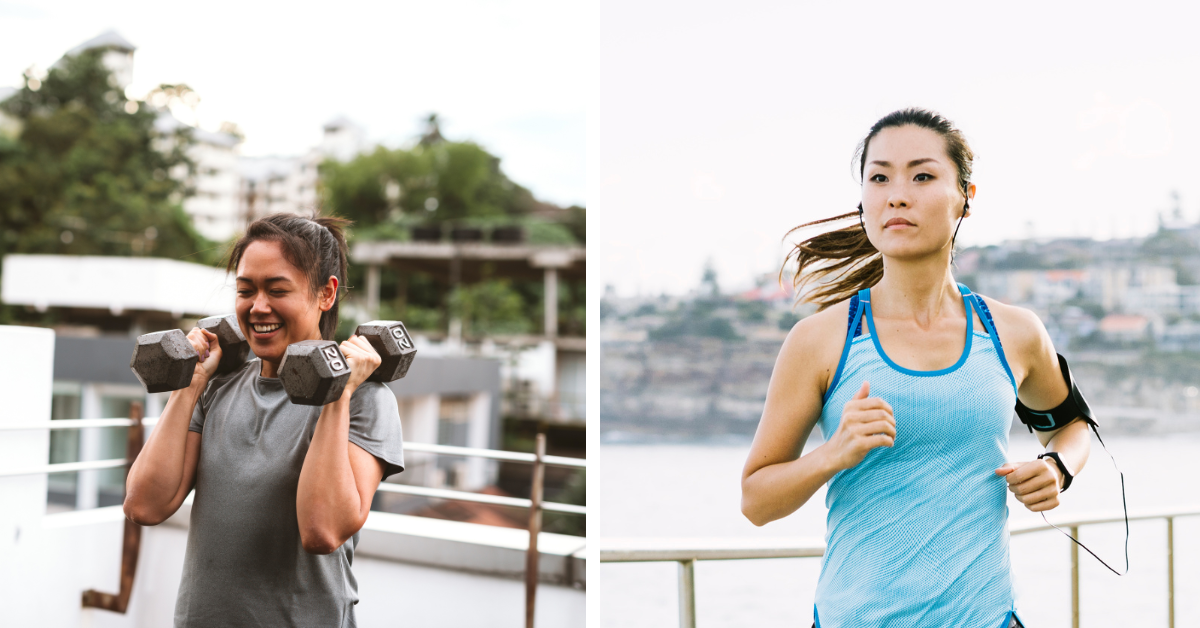In today’s fast-paced world, finding time to prioritise fitness can be a challenge. With work, family, and social commitments, it can feel overwhelming to decide between strength training and cardio exercises. Both offer unique benefits, but which one suits your lifestyle better?
So if you have limited time to exercise, and expect to take frequent time off between your exercise sessions, then what should you focus on for general health, longevity, and avoiding diseases such as cancer and heart disease? Alex, a Lifestyle Coach, and Functional Medical Practitioner from Levitise breaks down the advantages of each to help you make the best choice.
For a start, Alex believes that it can be argued that neither strength nor cardio should be prioritised, but rather, focusing on activities you enjoy or those that support the ability to participate in a beloved sport. Doing what you love is most likely to encourage consistency. However, if sports are not involved and the main goal is health and longevity, which is better: strength or cardio? Ideally, both, if time allows.
For those with limited time, the question becomes which to choose. Instead of analysing how quickly strength and cardio (or VO₂ max, the maximum oxygen consumption during intense exercise) are gained, the focus is on how quickly they are lost. This approach is particularly relevant for busy executives who often have limited time and may take regular breaks from their routines. Alex took things into his own hands and tested through the introduction of a regular running session into his weekly regime.
.png?width=1200&height=628&name=Blog_levitise%20(5).png)
Lifestyle Coach and Functional Medical Practitioner Alex from Levitise tests his cardio and strength performance over the course of a period.
Cardio Training
To Alex, running is just not his thing. He barely runs because he does not like it, and also due to the predominance of fast-twitch, type IIb muscle fibres (the muscle fibres predominantly used for strength and power). Despite a personal dislike for running, Alex knows that it will be beneficial to engage in some form of cardio activity at least once a week. To Alex, this is also seen as a form of mental discipline. Earlier this year, Alex completed a 2km track run in 12 minutes and 30 seconds. After maintaining the weekly running session for six weeks, his timing improved to 9 minutes and 33 seconds. A 24% improvement was observed—quick gains!
However, after taking a two-month break, Alex's most recent time recorded was 11 minutes and 30 seconds, indicating a 20% regression. It is likely that after another month or so, Alex's running performance will return to when he first started his running routine. Research seems to support this suggestion that VO₂ max reverts to baseline after 3 months of no exercise (see footnotes).
.png?width=1200&height=628&name=Blog_levitise%20(4).png)
Alex tests how quickly strength is lost, over a period of one year.
Strength Training
Alex's current deadlift training weight stands at 140kg, while his competitive maximum is 160kg. After taking a year off from deadlifting, he was able to lift 120kg during his first session back, which was achieved with relative ease in training. This represents about a 14% reduction from Alex's training weight, which is still significantly higher than his initial starting weight of 60kg.
To make a comparison, Alex experienced a 20% loss in cardio gains after just two months, while experiencing only a 14% loss of gains from strength training over the course of one year. Although this is not a perfect N=1 experiment, the observations appear to align with scientific research, which indicates that cardiovascular fitness is gained and lost more rapidly than strength, particularly with age.
To illustrate these comparative losses, Alex reviewed several studies and created a table to help visualise the findings.
| Weeks of Inactivity |
Cardio Losses |
Strength Losses |
| 1-2 |
start of decline |
none |
| 4 |
significant loss |
minimal |
| 6-8 |
substantial loss |
some |
| ~13 |
reversion to baseline |
significant |
This was a great study that looked at the difference between strength losses in young adults vs older adults:
| Gains and Losses |
20 to 30 year olds |
65 to 75 year olds |
| strength gains after 9 weeks of training |
34% |
28% |
| strength losses after 31 weeks of inactivity |
8% |
14% |
Alex found the statistics to be remarkable. Firstly, 70-year-olds can achieve a 28% increase in strength in just 9 weeks, which is comparable to the gains observed in 20-year-olds. This underscores that it’s never too late to begin strength training. Secondly, After 7 months of inactivity, 70-year-olds only lost 14% of their strength gains, which is quite impressive.
Interestingly, these findings appear to be consistent across both men and women. Research by Lemmer et al. (2000) revealed that older men and women experience similar relative gains and losses in strength, with women showing approximately a 14% loss after 7 months of inactivity, similar to men. The same trend is observed with VO₂ max.
Here are some other interesting findings from research papers:
.png?width=1200&height=628&name=Blog_levitise%20(2).png)
If you do a lot of cardio, you need to consume more calories than you’re burning. When you go on holidays, those extra calories that you are habitually eating have nowhere to go apart from into fat. Strength training increases glycogen stores in muscles through several mechanisms, including muscle hypertrophy, increased glycogen synthase activity, improved insulin sensitivity, and the repeated depletion and replenishment cycle of glycogen stores.
Cardiovascular training can lead to type IIb fibers converting to type IIa fibers. This adaptation enhances endurance capabilities but reduces the relative proportion of pure fast-twitch fibers for strength and power. Less muscle density can result in lower glycogen storage capacity.
.png?width=1200&height=628&name=Blog_levitise%20(3).png)
Research has shown that strength training improves metabolic rate, reduces risk of injury, and more.
Strength improves muscle density, which improves connective tissue strength and bone density. 100% of your white blood cells are created in your bone marrow. Stronger bones, more bone marrow, more white blood cells, stronger immune system - fewer coughs, colds, COVID, flu, and of course, it’s the job of your immune system to keep cancer at bay and there is a strong correlation between strength and not getting cancer.
Strength training also improves metabolic rate, reduces the risk of injury, enhances functional fitness for daily activities, helps in managing chronic conditions like diabetes and arthritis, enhances mental health by reducing stress and anxiety, boosts neuroprotective growth factors and new brain cell formation, significantly improves body image, self-perception, and a sense of accomplishment, promotes the release of growth hormone and testosterone, both of which are crucial for muscle growth and fat loss and balances other hormones like insulin and glucagon.
Takeaway
If you’re in your 40s and 50s and looking to start exercising for the first time, or in a while, then focusing on a strength training program initially probably makes sense (starting with a
holistic movement assessment first of course). After all, if you’re untrained, you’re going to get out of breath and achieve cardiovascular benefits just from lifting weights. Two weekly sessions are a good starting point. That’s where many of our clients start. There are 168 hours in a week, so 2 hours is just over 1% of your time.
If you feel like you have a bit more time to spare, then add in a 30-minute cardio session weekly on your own: fast swimming, cycling, or running, for example. Something that keeps you out of breath for that 30-minute interval.
Finally, always look for an excuse to walk - rather than take the car or public transport, particularly at the weekend when you have more time.
Featured Contributor:

Levitise is Singapore’s only all-encompassing health and wellness centre for senior executives. We provide personalised nutrition and lifestyle coaching, corrective exercise and personal training to help people improve and optimise their way of life.
Levitise's coaches specialise in helping you deal with, and avoid common, health concerns in Singapore such as weight management issues, sleep disorders, hormone imbalances, stress & anxiety, digestive issues, fatigue, diabetes and more serious complications without the use of medical drugs. Working in harmony with our nutrition and lifestyle coaches, our personal trainers specialise in solving back, neck and shoulder pain, improving joint flexibility, weight management, endurance conditioning and injury rehabilitation.
We have a full spectrum infrared sauna (near, mid and far) with low EMF, ELF & MF emissions that everyone loves for detoxification, lymphatic drainage, weight loss, pain relief and for generally optimising health.
Find out more here.
.png)

.png?width=1200&height=628&name=Blog_levitise%20(5).png)
.png?width=1200&height=628&name=Blog_levitise%20(4).png)
.png?width=1200&height=628&name=Blog_levitise%20(2).png)
.png?width=1200&height=628&name=Blog_levitise%20(3).png)
